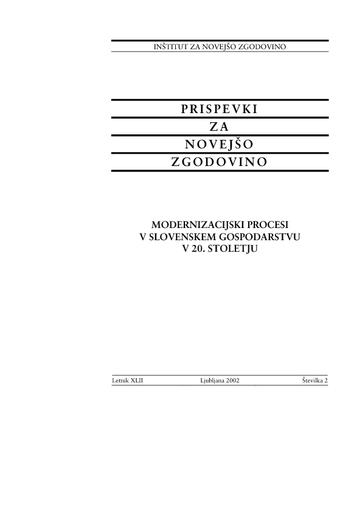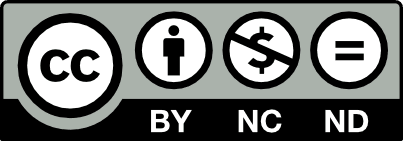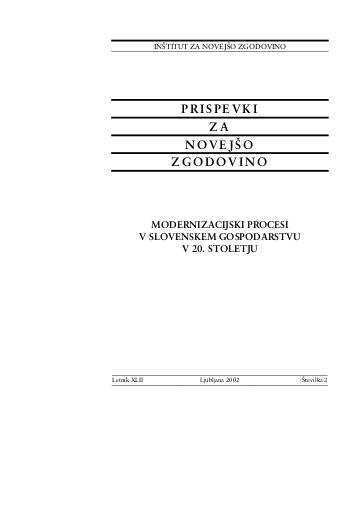
/
Periodicals
/
Prispevki za novejšo zgodovino
How the Politics Affected Slovenia's Economic Position in Yugoslavia

Author(s):Božo Repe
Co-author(s):Jasna Fischer (odg. ur.)
Leto:2002
Publisher(s):Inštitut za novejšo zgodovino, Ljubljana
Language(s):slovenščina
Type(s) of material:text
Rights:

This work by Božo Repe is licensed under Creative Commons Attribution-NonCommercial-NoDerivs 4.0 International
Files (1)

Name:Prispevki_za_novejso_zgodovino_2002_2.pdf
Size:1.36MB
Format:application/pdf
Permanent link:https://hdl.handle.net/11686/file227
Description
In the first as well as in the second Yugoslavia, politics had a decisive influence on Slovenia's economic position in Yugoslavia. This was a consequence, firstly, of the economic area which merged only partly compatible economies. Secondly, it was because the economic model, or better, economic models were created on the basis of ideological and political patterns which allowed politics to govern economy. Thirdly, it was a consequence of the confrontation of national economies (three informal economies in the first Yugoslavia and six formal economies in the second), which fought for the most favourable and predominant position. In 1918, Yugoslavia was established for political reasons and it also disintegrated for political reasons and inter-national relations. The economies failed to reach the degree of autonomy which would allow the economic reasons to justify the political sense of existence of the Yugoslav state.
Metadata (11)
- identifierhttps://hdl.handle.net/11686/1714
- title
- Vpliv politike na ekonomski položaj Slovenije v Jugoslaviji
- How the Politics Affected Slovenia's Economic Position in Yugoslavia
- creator
- Božo Repe
- contributor
- Jasna Fischer (odg. ur.)
- description
- In the first as well as in the second Yugoslavia, politics had a decisive influence on Slovenia's economic position in Yugoslavia. This was a consequence, firstly, of the economic area which merged only partly compatible economies. Secondly, it was because the economic model, or better, economic models were created on the basis of ideological and political patterns which allowed politics to govern economy. Thirdly, it was a consequence of the confrontation of national economies (three informal economies in the first Yugoslavia and six formal economies in the second), which fought for the most favourable and predominant position. In 1918, Yugoslavia was established for political reasons and it also disintegrated for political reasons and inter-national relations. The economies failed to reach the degree of autonomy which would allow the economic reasons to justify the political sense of existence of the Yugoslav state.
- Politika je tako v prvi kot drugi Jugoslaviji odločilno vplivala na ekonomski položaj Slovenije v Jugoslaviji. To je bila posledica umetno ustvarjenega ekonomskega prostora, ki je sledil nastanku obeh držav in je bil le deloma kompatibilen, potem ustvarjanja ekonomskega modela oz. ekonomskih modelov po ideoloških in političnih vzorcih, ki so omogočali prevlado politike nad gospodarstvom in nazadnje soočanja nacionalnih gospodarstev (v prvi Jugoslaviji treh neformalnih, v drugi šestih formalnih), ki so se med sabo borili za čim ugodnejši položaj in prevlado. Jugoslavija je bila leta 1918 ustanovljena iz političnih razlogov in tudi propadla je zaradi političnih in mednacionalnih razlogov. Gospodarstvo nikoli ni moglo doživeti tisto stopnjo avtonomije, ki bi omogočila, da bi ekonomski razlogi upravičili tudi politični smisel obstoja jugoslovanske države.
- publisher
- Inštitut za novejšo zgodovino
- date
- 2002
- type
- besedilo
- language
- Slovenščina
- isPartOf
- rights
- license: ccByNcNd
Citirano v (1)
| Tipologija | Avtor(ji) | Naslov | Kraj | Založba | Leto |
|---|---|---|---|---|---|
| 1.01 Izvirni znanstveni članek | Dobaja, Dunja | Delovnopravna zakonodaja v Sloveniji in pravice iz dela s poudarkom na pokojninskem zavarovanju 1945−1990 | Ljubljana | Inštitut za novejšo zgodovino | 2023 |